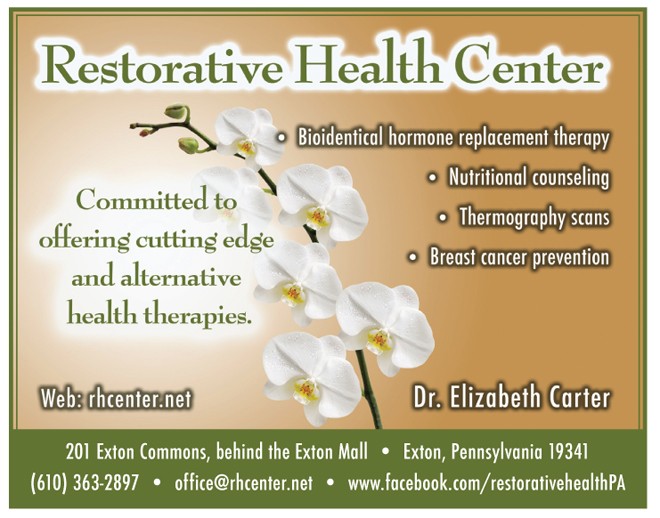Thermography & Evaluating The Effects Of Inflammation On The Breast Tissue
 By Dr. Elizabeth Carter
By Dr. Elizabeth Carter
Dr. Elizabeth Carter is a Chiropractor, Naturopath, M.D., and PhD (c), who has served the Main Line and Philadelphia area for 18 years, specializing in pediatric, pregnancy, and nutrition. Her practice, Restorative Health Center, is based in Exton, PA. Dr. Carter believes in comprehensive healthcare that gets to the root of a problem while it is still manageable and utilizes naturopathic healing strategies along with chiropractic services to promote true bodily and mental health. With her diverse background in professional dance and her passion for outdoor adventure, Dr. Carter is well versed in movement, natural body connections, and the power of holistic healing.
Restorative Health Center, located in Exton, is a wellness center committed to offering cutting edge and alternative health therapies. Our women’s health services are integral to our practice and include bioidentical hormone replacement therapy, nutritional counseling and thermography scans. Dr. Carter is especially passionate about breast cancer prevention.
Breast cancer is the most common cancer for women, and the risk increases with age. Risk is also higher in women whose close relatives have had the disease, women without children, and those that have had their first child after age 30. However, every woman is at risk of developing breast cancer. Current research indicates that one in every eight women in the U.S. will get breast cancer in her lifetime.
With the prevalence of breast cancer in our population, we must use every means possible to detect cancers when there is the greatest chance of survival. Thermography is a partner procedure of mammography that poses no health risks to the patient. It is a heat scan of the breast tissue that uses no radiation and involves no painful manipulation.

Signs of pre-cancerous tissue or early stage cancers that are too small to be found by physical examination or a mammogram can be indicated by a disruption of heat or blood flow under the skin on a thermography scan.
Using tools such as thermography, a patient can synthesize information about many different aspects of her general health to form a clearer picture of her breast health. The greatest single risk factor for breast cancer is lifetime exposure of the breasts to estrogen. Breast thermography plays a significant role in prevention by warning women if they have excess estrogen activation in their breasts, facilitating their ability to pursue preventative measures.
In the case of estrogen, thermography offers another unique piece of information. Thermography can help identify Breast Specific Estrogen Dominance. This is different than systemic estrogen dominance in that it occurs specifically in the breasts and may or may not be systemic. Breast Specific Estrogen Dominance produces vascular changes similar to pregnancy and lactation. These changes are distinctly different than those of cancer and can let us know whether or not breast specific estrogen dominance exists and whether or not it is currently elevating the risk for developing breast cancer. If identified, thermography can then be used to monitor the effectiveness of intervention.
“For breast cancer to be eliminated we must move beyond early detection to the realm of prevention. To create a prevention/intervention we must be able to identify the modifiable risk factors and learn to improve or eliminate them. To determine if that intervention is effective, we need thermography to objectively assess the effects of that intervention on the physiology of the breasts.”1
1. Christiane Northrup, M.D. Board-certified ob/gyn, bestselling author
Posted: October 12, 2010 The Huffington Post
The Best Breast Test: The Promise of Thermography.
Restorative Health Center is located at 201 Exton Commons, behind the Exton Mall. For hours, questions and to schedule an appointment, call (610) 363-2897, or email us at [email protected]. Further information is available at www.rhcenter.net.





